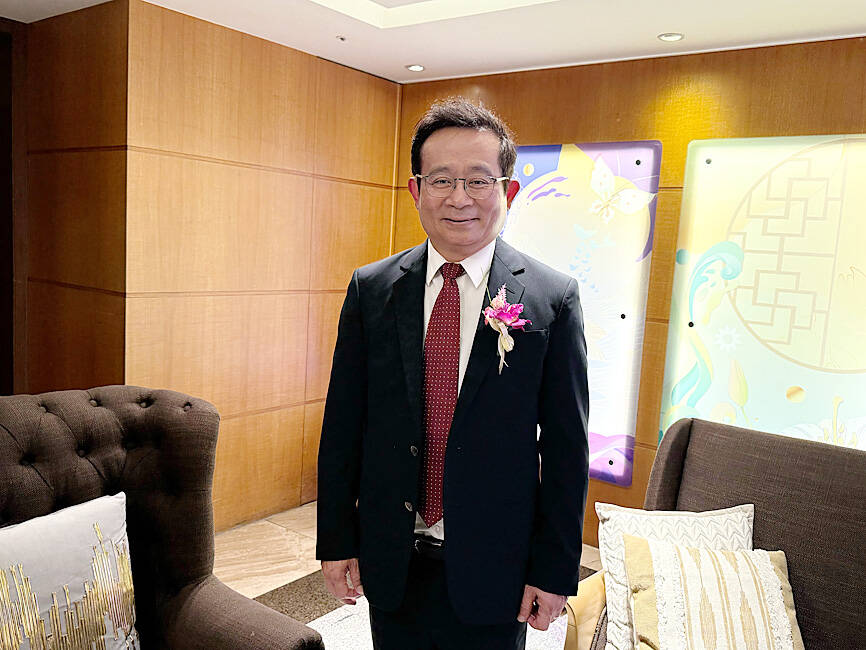Aspeed Technology Inc (信驊), which supplies baseboard management controls (BMCs) for servers powered by Nvidia Corp chips, yesterday said it expects revenue next quarter to grow between 25 percent to 30 percent year-on-year, thanks to strong demand for servers and higher selling prices.
Revenue is to rise to between NT$2.6 billion and NT$2.7 billion (US$82.68 million to US$85.86 million), up from NT$2.07 billion in the first quarter, Aspeed said, adding that it would mark the strongest quarterly revenue in the company’s history.
On a quarterly basis, revenue is expected to grow about 29 percent or 30 percent from between NT$2 billion and NT$2.1 billion, the company said.

Photo: Vanessa Cho, Taipei Times
“We believe the results of the fourth quarter will be better than our guidance,” Aspeed chairman Chris Lin (林鴻明) told an investor conference arranged by Taipei Exchange in Taipei. “Demand in the first quarter looks very strong, as our book-to-bill ratio surpasses one. But, our forecast is relatively conservative constrained by tight substrate supply.”
The average selling prices of BMCs are also trending up, as more functions, such as data protection or access control, are integrated into the chip, Lin said.
BMC is a microcontroller on server hardware that provides remote monitoring, management and control capabilities independently from the main operating system.
Gross margin is expected to improve by between 66.5 percent and 67.5 percent next quarter, compared with 66.23 percent in the first quarter, Aspeed said.
That was little changed from this quarter, the company added.
Aspeed is the world’s biggest BMC supplier, with 70 percent market share. A server rack equipped with Nvidia’s GB300 chip needs 71 BMCs and that number is expected to increase after Nvidia rolls out a new-generation Vera Rubin-based artificial intelligence (AI) chip for servers next year.
The company said it plans to ramp up production of a new BMC, codenamed AST 2700, in the first quarter of next year.
The new BMC is made on 12-nanometer technology, and is the first 12-nanometer chip designed by Aspeed, it said.
In addition to AI servers, rapidly growing demand for general-purpose servers, such as storage servers, would also be a growth driver, Lin said.
“AI servers do not replace general-purpose servers. They are complementary,” he added.
Aspeed said it expects the number of BMCs used in AI servers to grow 40 percent over the next two years, 35 percent by 2028, and 30 percent in 2029 and 2030.
The consumption of BMCs for general-purpose servers is expected to rise by 6.5 percent next year and expand at an annual rate of 5 percent through 2030, the company said.
In the third quarter, Aspeed’s net profit surged by 93 percent to NT$1.21 billion from NT$629 million the previous quarter. That represented an annual growth of 66.48 percent from NT$729 million.
Earnings per share rose to NT$32.12 from NT$16.65 in the second quarter and NT$19.3 in the third quarter last year.

Shiina Ito has had fewer Chinese customers at her Tokyo jewelry shop since Beijing issued a travel warning in the wake of a diplomatic spat, but she said she was not concerned. A souring of Tokyo-Beijing relations this month, following remarks by Japanese Prime Minister Sanae Takaichi about Taiwan, has fueled concerns about the impact on the ritzy boutiques, noodle joints and hotels where holidaymakers spend their cash. However, businesses in Tokyo largely shrugged off any anxiety. “Since there are fewer Chinese customers, it’s become a bit easier for Japanese shoppers to visit, so our sales haven’t really dropped,” Ito

The number of Taiwanese working in the US rose to a record high of 137,000 last year, driven largely by Taiwan Semiconductor Manufacturing Co’s (TSMC, 台積電) rapid overseas expansion, according to government data released yesterday. A total of 666,000 Taiwanese nationals were employed abroad last year, an increase of 45,000 from 2023 and the highest level since the COVID-19 pandemic, data from the Directorate-General of Budget, Accounting and Statistics (DGBAS) showed. Overseas employment had steadily increased between 2009 and 2019, peaking at 739,000, before plunging to 319,000 in 2021 amid US-China trade tensions, global supply chain shifts, reshoring by Taiwanese companies and

Taiwan Semiconductor Manufacturing Co (TSMC, 台積電) received about NT$147 billion (US$4.71 billion) in subsidies from the US, Japanese, German and Chinese governments over the past two years for its global expansion. Financial data compiled by the world’s largest contract chipmaker showed the company secured NT$4.77 billion in subsidies from the governments in the third quarter, bringing the total for the first three quarters of the year to about NT$71.9 billion. Along with the NT$75.16 billion in financial aid TSMC received last year, the chipmaker obtained NT$147 billion in subsidies in almost two years, the data showed. The subsidies received by its subsidiaries —

Taiwan Semiconductor Manufacturing Co (TSMC) Chairman C.C. Wei (魏哲家) and the company’s former chairman, Mark Liu (劉德音), both received the Robert N. Noyce Award -- the semiconductor industry’s highest honor -- in San Jose, California, on Thursday (local time). Speaking at the award event, Liu, who retired last year, expressed gratitude to his wife, his dissertation advisor at the University of California, Berkeley, his supervisors at AT&T Bell Laboratories -- where he worked on optical fiber communication systems before joining TSMC, TSMC partners, and industry colleagues. Liu said that working alongside TSMC